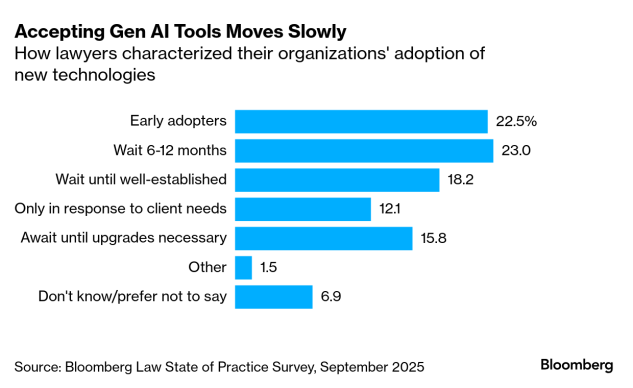Adoption of artificial intelligence isn’t transforming the day-to-day practices of many lawyers—at least not yet, according to Bloomberg Law’s new State of Practice survey.
Just 21% of attorneys at law firms and companies say they are using generative AI “about once a day” or more. Another 31% said they use it “a few times a month.”
Yet in a sign that widespread adoption is still elusive, about a third of survey respondents said they have “never” used AI in the last six months.
“We overestimate the impact technology is going to have in the short term and underestimate in the long term,” said Rudy DeFelice, the global head of the legal AI-focused Harbor Labs.
In the short term, lawyers don’t have many incentives to make their work more efficient with AI, DeFelice said.
That dynamic is also reflected in the survey: Only 23% of lawyers said their organizations are early adopters of new technology. Many others say their organizations are moving more slowly.
“We’ve got a good thing,” DeFelice said. “We bill by the hour.”
Some lawyers worry about the embarrassing hallucinations that large language models can produce. Others are concerned about giving sensitive client data to an AI vendor. Many others haven’t yet seen AI make their work better.
At the same time, there’s no question that lawyers are feeling the pressure to adopt AI—not just from software vendors, but from law firm partners and corporate leaders who are hoping the technology will make legal work more efficient and cut costs.
AI at Work
Alicia Hawley, of counsel at K&L Gates and a survey respondent, said she wasn’t surprised the findings show AI adoption lagging. Among lawyers, enthusiasm about AI varies greatly depending on experience level and what practice group someone is in, Hawley said.
“Those two things in particular impact the level of comfort in experimenting with the tools, the level of comfort in then actually implementing the tools,” she added.
Many associates at firms today grew up with cell phones while long-time partners didn’t, she notes. “It’s a different world as far as just the level of comfort and the accessibility of technology,” Hawley said.
At K&L Gates, Hawley said her eDiscovery practice group is more comfortable with gen AI because it’s been working with different versions of AI for decades and can easily see the new technology’s potential when using it to sift through vast sets of discovery.
Benjamin Cramer, an attorney in the tax practice at Wood + Lamping LLP in Ohio, said he almost always has an AI tool open on his computer.
“That’s a story I’ve been telling colleagues who are taking the ostrich approach and want this to go away,” said Cramer, who also responded to the survey. “But it’s not going away, so let’s use it.”
Cramer had been struggling to get figures in an IRS report to match with his client’s numbers, so he turned to Copilot for help. He uploaded a spreadsheet of 14,000 transactions and asked Copilot to figure out why the numbers didn’t line up. The software found a $50,000 issue that Cramer, his client, and the IRS had all missed. That discovery led him down a path that would ultimately lead to the lower settlement figure, he said.
As much as he said he wishes he could’ve caught the discrepancy that AI flagged, those 14,000 entries were simply too many to look through.
“Going down that rabbit hole led to a much bigger issue that I wouldn’t have known to dig for,” he said. “And frankly we wouldn’t have thought it was worth the effort.”
The Bloomberg Law survey, which had more than 750 respondents and was in the field from Sept. 8 to Sept. 22, is a snapshot in time. As such, it might not capture the full range of AI use by lawyers, including under-the-table use of tools that aren’t officially licensed by law firms, DeFelice said.
“Almost everybody is using AI tools pretty regularly, even if its just kind of integrated with their email through Copilot or something like that, or on Zoom,” he said. “They don’t even know they’re using it, but its being used around them, and it might not show up on the surveys.”
To contact the reporter on this story:
To contact the editors responsible for this story:
Learn more about Bloomberg Law or Log In to keep reading:
See Breaking News in Context
Bloomberg Law provides trusted coverage of current events enhanced with legal analysis.
Already a subscriber?
Log in to keep reading or access research tools and resources.

